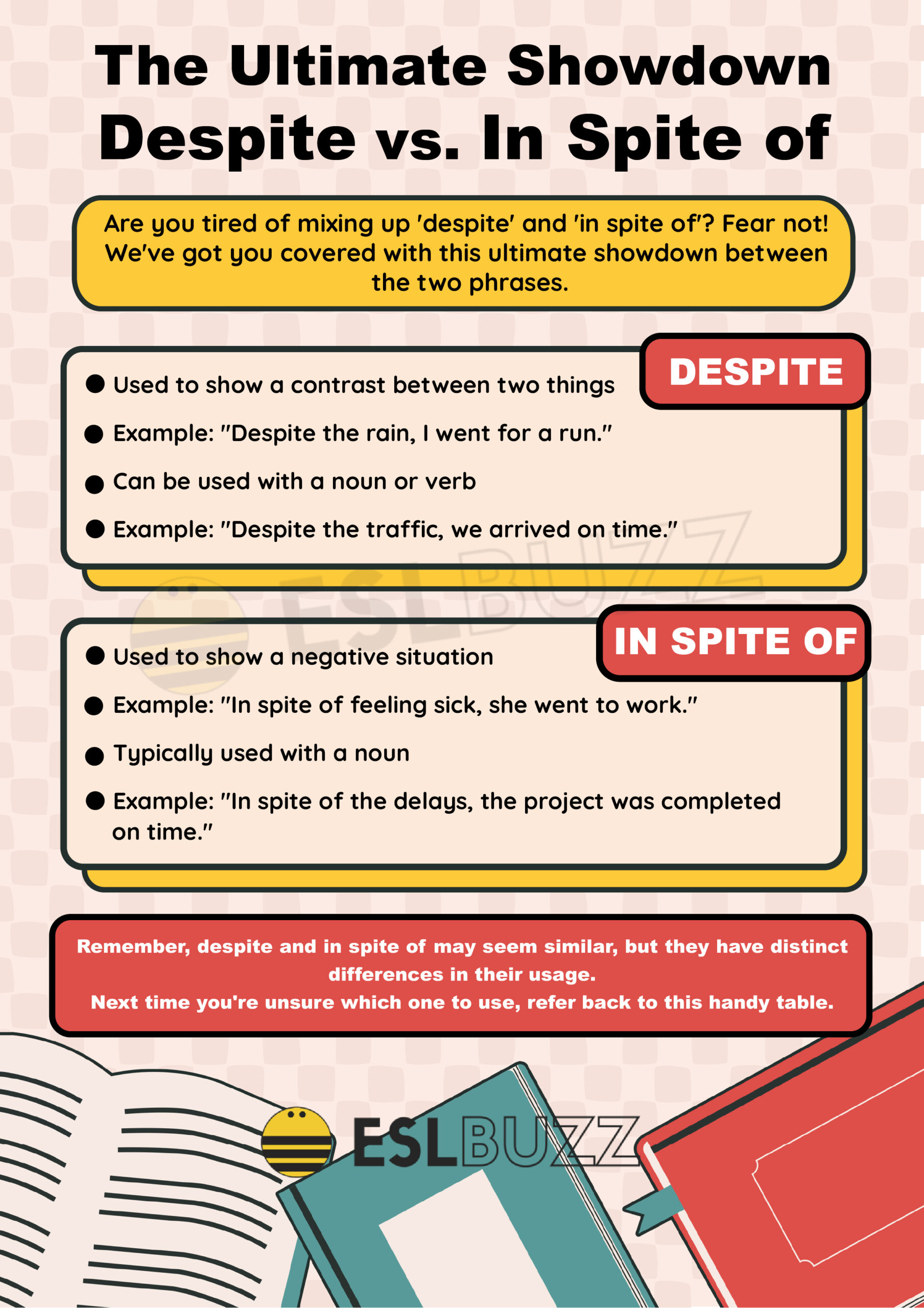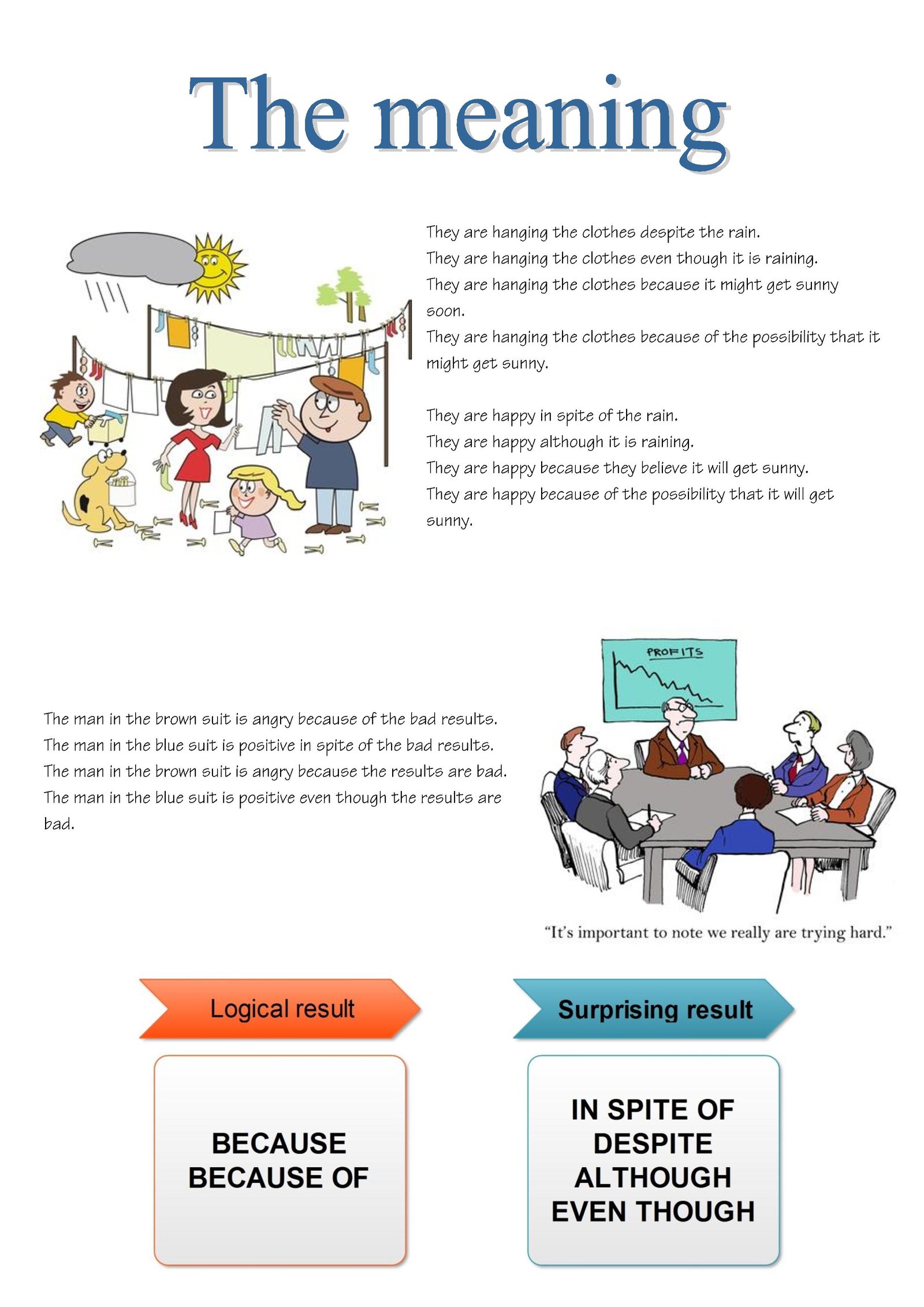Have you ever found yourself pausing over certain word pairings, wondering if there's a secret handshake you're missing? Perhaps you've heard people talk about "in spite of" and "despite" as if they were very different, or maybe you've been told one is better than the other. Well, you know, it's a common thought, and a lot of folks wonder about this sort of thing. It's almost as if language likes to play little tricks on us sometimes, isn't it?
The truth about these particular word arrangements is, quite simply, that they carry the same core idea. They are, in essence, two ways of saying the very same thing. So, to be honest, if you've been fretting over which one to pick, you can probably relax a little. It’s pretty much a matter of personal choice, more or less.
This discussion aims to clear up any lingering questions about these phrases. We'll look at what they actually mean, how people usually put them to use, and give you plenty of situations where you can see them in action. You'll definitely get a better feel for them, and perhaps even feel more confident using them in your own conversations and writings. It's all about making your words work for you, right?
Table of Contents
- What Does "In Spite Of" Truly Convey?
- Getting Clear on "In Spite Of" Meaning
- Is There a Real Difference Between "Despite" and "In Spite Of"?
- Unpacking the Interchangeable "In Spite Of" Meaning
- How Do We Use "In Spite Of" in Everyday Talk?
- Real-World Scenarios for "In Spite Of" Meaning
- Does "In Spite Of" Relate to "Spite" Itself?
- The Deeper "In Spite Of" Meaning
What Does "In Spite Of" Truly Convey?
When you hear or read "in spite of," what it's really getting at is a sense of something happening even when there's an opposing factor. Think of it like this: something goes ahead, or a situation holds true, without being stopped or changed by another thing. It's about showing a contrast, or a situation where one thing doesn't prevent another. You know, like, "The picnic went on in spite of the light rain." The rain was there, but it didn't stop the fun. That's the core idea, essentially.
Getting Clear on "In Spite Of" Meaning
This phrase, "in spite of," is a small group of words that act like a connection point in a sentence. It helps us show that something is true or happens, even when there's a reason it might not. It means "regardless of," or "even though," or "without being affected by." So, when someone says, "She kept smiling in spite of her difficulties," they're telling you her good mood wasn't changed by her troubles. It's a way of highlighting resilience or persistence, you might say. It’s pretty straightforward, really.
Consider a situation where someone is feeling unwell, but they still manage to do something remarkable. You could say, "He delivered a fantastic presentation in spite of feeling a bit under the weather." This shows that his feeling unwell didn't stop his good performance. Or, perhaps, a team achieves a win when conditions are tough. "The team secured the victory in spite of the challenging conditions on the field." The difficult conditions were present, but they didn't stop the win. It’s about overcoming, or at least proceeding, with something that could have been a hindrance, you know.
The core message here is that the first part of the sentence is true or happens, even when the second part of the sentence presents a reason it might not. It's a way of showing that something is unaffected by a particular circumstance. For example, "The project finished on time in spite of the budget cuts." The budget cuts were a hurdle, but they didn't delay the project. It's a useful way to express a kind of surprising outcome, or a result that goes against what you might expect, more or less.
Is There a Real Difference Between "Despite" and "In Spite Of"?
This is a question that pops up a lot, and it's a good one. People often wonder if "despite" and "in spite of" are distinct words, perhaps with subtle differences in their use or feeling. You know, like how some words have slightly different shades of meaning. However, when it comes to these two, the simple answer is that they mean the same thing. They are, essentially, two ways to express the same idea of something happening without being hindered by something else. So, you can swap them out for each other, and the meaning of your sentence will stay the same, basically.
Unpacking the Interchangeable "In Spite Of" Meaning
It's true, some people might tell you they were taught that one is better or different from the other. But, as a matter of fact, "despite" and "in spite of" are truly interchangeable. They both work to introduce a fact that makes another fact seem a little surprising. For instance, "She went for a walk in spite of the cold weather" means the same as "She went for a walk despite the cold weather." There's no real difference in the sense conveyed. It's just a matter of choosing which phrase feels right to you in the moment, you know?
These two phrases are both little connectors that show a contrast. They both mean "regardless of" or "even though." So, if you're writing or speaking and you find yourself wondering which one to use, you can honestly pick either one. "The show was a success in spite of the technical glitches" carries the same message as "The show was a success despite the technical glitches." The message is that the glitches didn't stop the show from being good. It's pretty cool how language can offer these sorts of options, isn't it?
One small thing to remember is that "despite" is a single word, while "in spite of" is a group of three words. But this doesn't change their shared meaning or how you can use them. For example, "They finished the race in spite of their fatigue" conveys the same idea as "They finished the race despite their fatigue." The point is that their tiredness didn't stop them from crossing the finish line. So, essentially, don't worry too much about picking one over the other for a different meaning, because there isn't one, generally speaking.
How Do We Use "In Spite Of" in Everyday Talk?
So, how do people actually use "in spite of" when they're talking or writing? Well, it's typically placed before a fact or a situation that might make the main action or outcome seem a bit unexpected. It's a way to highlight that something happened, or is true, even with a challenging circumstance present. You'll often see it connecting two ideas where one might logically seem to prevent the other, but it doesn't. It's pretty useful for showing a sense of persistence or an outcome that defies expectations, you know.
Real-World Scenarios for "In Spite Of" Meaning
Let's look at some everyday examples to get a better feel for it.
Imagine someone playing a game: "Somehow the eagles managed to pull off a victory in spite of themselves." This means they won even though they might have made mistakes or had issues that could have stopped them. It's like saying they succeeded despite their own shortcomings, which is kind of interesting, isn't it?
Consider a personal moment: "I knocked over my drink and called her the wrong name at one point, but I still had a good time in spite of my clumsiness." Here, the speaker's mistakes didn't ruin their enjoyment. The good time happened regardless of the little mishaps. It's a common way to talk about things that go wrong but don't derail the main event, essentially.
Another example: "In spite of his injury, Ricardo will play in Saturday's game." This tells us that Ricardo's injury is a fact, but it won't stop him from playing. It's a way of expressing that the injury won't affect his participation. This kind of statement shows determination, or a situation where a difficulty is overcome, you know.
Think about official matters: "Congress passed the bill, in spite of frequent objections." This means that even though there were many people who didn't like the bill, it still became law. The objections were there, but they didn't prevent the bill from passing. It's a good way to describe how a decision can go through even with opposition, more or less.
Here's another one: "In spite of her orders to stay, I left." This shows a direct contradiction. Her orders were to remain, but the person left anyway. The leaving happened without regard for the instructions. It's a clear way to show that one action was taken even when another was prescribed, pretty much.
And for a final example: "In spite of the bad weather, I had fun on my trip." The weather was not good, but it didn't stop the person from having a good time. The fun happened regardless of the weather conditions. It's a simple, clear way to show that an unpleasant situation didn't ruin the experience, you know, which is pretty common.
Does "In Spite Of" Relate to "Spite" Itself?
This is a curious point, because the word "spite" on its own carries a rather negative feeling. It often means a sort of petty ill will or a desire to annoy or thwart someone. So, it's fair to wonder if "in spite of" carries any of that negative energy. Interestingly, while the phrase "in spite of" includes the word "spite," its meaning has really evolved to be quite separate from the individual word's negative sense. It's almost as if the phrase developed its own identity, you know?
The Deeper "In Spite Of" Meaning
The original meaning of "spite" does indeed refer to a feeling of ill will or a wish to cause trouble. You might hear someone say, "She did it out of spite," meaning she did it to be mean or to annoy someone. However, when we use the phrase "in spite of," it doesn't mean "because of ill will." Instead, it simply means "without being affected by" or "regardless of." So, the negative feeling tied to the single word "spite" isn't present in the phrase "in spite of." It’s a bit of a linguistic quirk, you might say.
Think of it like this: "In spite of the loud music, he managed to sleep." This doesn't mean the music was trying to be mean to him. It just means the music was loud, but it didn't stop him from sleeping. The phrase has lost that original negative connection to "spite" when used in this particular combination. It's just a way to show that something happens even when there's an opposing factor. So, you don't need to worry about implying bad intentions when you use "in spite of," essentially.
The phrase "in spite of" is what we call a "phrasal preposition." It acts as a single unit that connects ideas, and its overall meaning is different from the individual words that make it up. It means "unaffected by something." So, when you see "in spite of," just remember it's there to show that something happens or is true, even when there's a reason it might not be. It's a useful tool for showing contrast and persistence in language, pretty much.


